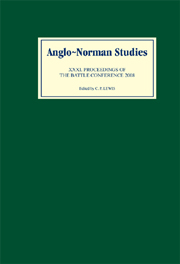Book contents
- Frontmatter
- Contents
- LIST OF ILLUSTRATIONS, MAPS, AND TABLES
- EDITOR'S PREFACE
- ABBREVIATIONS
- Kingship, Lordship, and Community in Eleventh-Century England (R. Allen Brown Memorial Lecture)
- Citadels of God: Monasteries, Violence, and the Struggle for Power in Northern England, 1135–1154
- Writing Civil War in Henry of Huntingdon's Historia Anglorum
- Land, Family, and Depredation: The Case of St Benet of Holme's Manor of Little Melton
- Brothers at Court: Urse de Abetot and Robert Dispenser
- Gerald of Wales and the Prophet Merlin
- The First Hundred Years of the Abbey of Tiron: Institutionalizing the Reform of the Forest Hermits
- All Roads Lead to Chartres: The House of Blois, the Papacy, and the Anglo-Norman Succession of 1135
- The Vita Ædwardi: The Politics of Poetry at Wilton Abbey
- William of Malmesbury, King Henry I, and the Gesta Regum Anglorum
- Twelfth-Century Receptions of a Text: Anglo-Norman Historians and Hegesippus
- LIST OF CONTENTS OF VOLUMES 1–30
Brothers at Court: Urse de Abetot and Robert Dispenser
Published online by Cambridge University Press: 12 September 2012
- Frontmatter
- Contents
- LIST OF ILLUSTRATIONS, MAPS, AND TABLES
- EDITOR'S PREFACE
- ABBREVIATIONS
- Kingship, Lordship, and Community in Eleventh-Century England (R. Allen Brown Memorial Lecture)
- Citadels of God: Monasteries, Violence, and the Struggle for Power in Northern England, 1135–1154
- Writing Civil War in Henry of Huntingdon's Historia Anglorum
- Land, Family, and Depredation: The Case of St Benet of Holme's Manor of Little Melton
- Brothers at Court: Urse de Abetot and Robert Dispenser
- Gerald of Wales and the Prophet Merlin
- The First Hundred Years of the Abbey of Tiron: Institutionalizing the Reform of the Forest Hermits
- All Roads Lead to Chartres: The House of Blois, the Papacy, and the Anglo-Norman Succession of 1135
- The Vita Ædwardi: The Politics of Poetry at Wilton Abbey
- William of Malmesbury, King Henry I, and the Gesta Regum Anglorum
- Twelfth-Century Receptions of a Text: Anglo-Norman Historians and Hegesippus
- LIST OF CONTENTS OF VOLUMES 1–30
Summary
The vilification of Urse de Abetot by the leading monastic writers of the Anglo- Norman period needs no introduction, but while this evaluation of his career and that of his brother Robert enlarges on their misdeeds in some areas, it also introduces some extenuating circumstances in others.
The Tancarville connection
Ralph de Tancarville, the first in a line of hereditary chamberlains of Normandy, already held this office during the reign of Duke Robert I, and continued to serve down to his death in 1079. Following the Norman Conquest, control over both the royal and ducal revenues was centralized in the camera, under the continuing supervision of the master-chamberlains of the house of Tancarville. Ralph did not operate in person in England, where the duties of his office were presumably discharged by deputy.
It was suggested by G. H. White that Ralph de Tancarville had a brother, Amaury de Abetot, and that Urse de Abetot was this man's elder son. Urse attested Ralph's charter granting benefactions to the collegiate church of Saint-Georges-de-Boscherville, which he is said to have founded c. 1050. His grants were confirmed by Duke William, before his invasion of England. If Ralph's charter dated from the time of his foundation of the collegiate church, then Urse would have been born c. 1030, but since it was issued at the dedication, when much of the building would have been completed, a date of birth in the 1040s might be indicated.
- Type
- Chapter
- Information
- Anglo-Norman Studies 31Proceedings of the Battle Conference 2008, pp. 64 - 89Publisher: Boydell & BrewerPrint publication year: 2009



